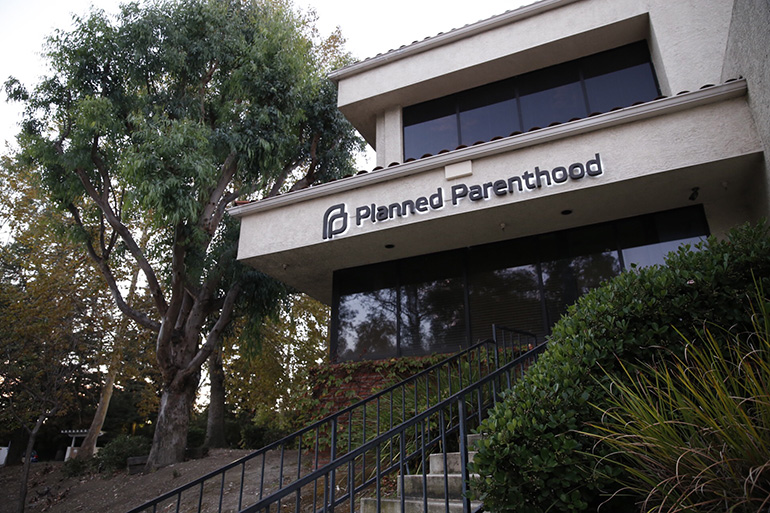As national Republican leaders continue to try to defund Planned Parenthood, California and other states are considering steps to protect access to family planning services.
California legislators have introduced a bill that would lock into state law a federal rule that allows Medicaid patients to see family planning providers of their choice. The bill is designed to preserve Californians’ access to Planned Parenthood and other reproductive health clinics should federal officials drop the rule.
The 30-year-old federal rule, known as “the free choice of provider law,” allows people enrolled in a Medicaid managed-care plan to receive family planning services from any qualified Medicaid provider, even if it’s out of their plan’s network. Providers are able to receive reimbursements from Medicaid for services provided to these out-of-network patients.
The California bill, authored by Sen. Ed Hernandez (D-West Covina), cleared the Senate Health Committee last month and is scheduled for a hearing on Monday in the Senate Appropriations Committee. It is co-sponsored by Planned Parenthood Affiliates of California and Essential Access Health, formerly known as the California Family Health Council.
According to the bill’s supporters, this rule allows patients to get care from a provider they feel most comfortable with.
The bill would protect Medi-Cal patients’ access to Planned Parenthood and other family planning clinics and would signal California’s willingness to pay those providers regardless of federal changes, but it does not assure state funding should federal funding evaporate. Lawmakers would need to pass a measure assuring that funding, said Greg Cramer, a legislative advocate with Planned Parenthood Affiliates of California.
The future of the federal “free choice of provider” protection is uncertain in the current political climate, said Amy Moy, vice president of public affairs at Essential Access Health.
“Women need choices for many reasons: confidentiality concerns, quality of care, to avoid service delays,” Moy said.
About a third of Californians receive Medi-Cal, California’s version of Medicaid, most through managed-care plans. Medi-Cal pays for about half of the state’s Planned Parenthood clinics’ budgets.
The American Health Care Act, which would repeal and replace the Affordable Care Act and now is being considered in the U.S. Senate, proposes to cut federal funding for Planned Parenthood for a year. In California, Planned Parenthood offices recorded 850,000 patient visits last year.
The bill, SB 743, would benefit Planned Parenthood in allowing its California clinics to continue to see out-of-network Medi-Cal patients, but the protection would not be exclusive to the organization, Moy said.
Planned Parenthood “of course is a vital access point for family planning care for a lot of California women. This bill would be helpful for them, but this goes beyond Planned Parenthood,” she said.
Last month, Maryland became the first state to pass a law committing to use state funds to reimburse Planned Parenthood for its services if federal money is cut.
“That’s something we would like to see California do if the federal action moves forward,” said Cramer.
But funding California’s 115 Planned Parenthood clinics with state money is very different than funding Maryland’s nine, Cramer said. Planned Parenthood’s abortion services for Medicaid enrollees are reimbursed with state money, as federal law prohibits the use of federal Medicaid dollars to pay for abortions.
“[SB 743] is one measure to try to defend ourselves. But we need a lot more,” Cramer said.
Planned Parenthood clinics already struggle to stay open due to the low Medicaid reimbursement rates, Cramer said. The organization’s clinics in Richmond and Concord are likely to close before the end of this year. Other clinics are expected to cut back hours, Cramer said.
Opponents of the bill say they’re concerned it will promote abortion as a standard practice of women’s health by expanding access to providers who perform such service.
“We don’t think that the state should be funding or expanding their role of promoting abortions, in particular among Medi-Cal recipients, who are low-income,” said Sandra Palacios, associate director for governmental relations with the California Catholic Conference.
A policy review published this month by the Guttmacher Institute recommends that states take steps similar to those being taken by California and Maryland to minimize the effects of any federal family planning cuts or policy changes.
The review recommends that states pass laws that would require that Medicaid cover family planning services and supplies, including all contraceptive methods, in case the federal government makes it only an option.
Adam Sonfield, senior policy manager at the Guttmacher Institute and author of the policy brief, said the California bill would resolve only one of many problems that family planning organizations could face under the current administration.
“That’s why advocates are pushing to go beyond that federal level,” Sonfield said.
